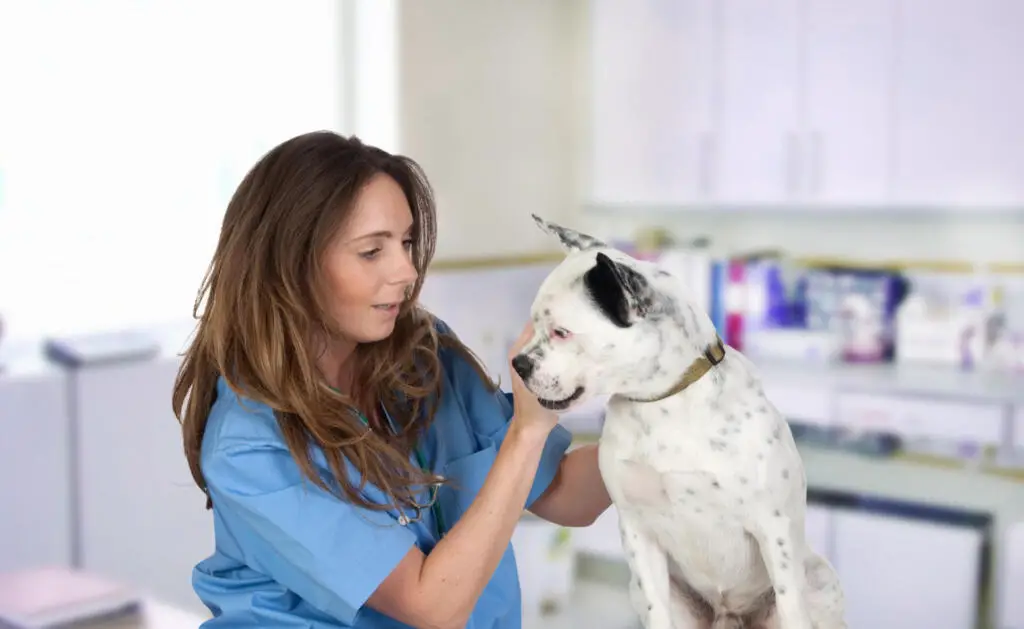If you’re new to raising a healthy dog, then you’re likely curious about what it entails. Keeping your pet healthy and happy for life means understanding their needs for food, lifestyle, and activity – and this post is here to help.
Today, let’s discuss the importance of a balanced diet, regular physical activity, and maintaining a grooming routine. You will also gain insights into preventive measures to keep your furry friends safe and healthy throughout their lives.
Article contents
The role of nutrition in dog health
Raising a healthy dog right means feeding them well. Here are some basic tips to follow:
- Give your dog puppy food until they’re around a year old. The American Kennel Club says that smaller dogs can switch to adult food at 7 to 9 months, while bigger dogs should wait until 12-14 months. They advise that it’s best to err on the side of caution, as older dogs can still benefit from puppy food.
- Pay careful attention to calorie requirements. The back of the bag will show basic amounts, but these often aren’t true to the dog’s needs. Instead, use a calorie calculator that takes considerations beyond weight into account, and adjust their nutrition as your dog grows.
- Include treats in calorie calculations: If you’re training a dog and need lots of treats or kibble pieces, factor that into your calculations to avoid giving dogs too much nutrition, which is as bad as too little.
- Get recommendations from your veterinarian. Vets know far more than you can be expected to about what is good for animals. Get brand recommendations from them.
In general, good brands to buy include Taste of the Wild, Blue Buffalo, Ollie, and The Honest Kitchen.

Exercise routines for a healthy dog
Dogs are no different than people when it comes to exercise. Regular movement keeps joints and muscles strong, builds bone mass, and increases the function of the heart and other organs. Plus, exercise helps your dog maintain a calm and positive attitude. When dogs are under-exercised, they start to feel confined and frustrated, which leads to problem behaviors such as barking or chewing.
Therefore, raising a dog means getting them plenty of physical activity. This can include walking, running, and hiking; chasing balls and frisbees; and wrestling and playing with dog toys.
Make sure when running that you wait until the dog is old enough. Puppies should not run before 6 months or so, and should not even walk on pavement during that time. Instead, get them moving inside and on grass until they’re stronger.
Note that you should avoid making the mistake of getting a dog so that you’ll “be forced to exercise.” While your overall exercise level likely will go up somewhat, it’s a better idea to match your dog breed to your current level of time, energy, and enthusiasm. That way you avoid underserving your pup.
Grooming tips for beginners
The next consideration when raising a healthy dog is grooming. Keeping your dog clean and tidy is not only more aesthetically pleasing, it’s necessary for their overall health. When dogs are ungroomed, they trap dirt and irritants in their fur, which can lead to discomfort, scratching, hot spots, or infection.
To keep dogs healthy, make sure to:
- Brush them regularly if they have longer hair, and intermittently – especially when shedding – if they’re shorter-haired
- Bathe them about once a month, more often for oily and longer-haired breeds (retrievers) and less often for short-haired breeds with balanced skin (chihuahuas)
- Check your pup’s ears for black buildup or irritation, and clean them with a natural ear solution if necessary
- Brush your dog’s teeth to avoid later dental problems such as plaque buildup, loose teeth, uncomfortable and bleeding gums, and teeth that need pulling
Also, note that if you buy a breed that has hair rather than fur, you will need to perform extra grooming duties. Unlike fur, hair keeps growing, so you need to cut it regularly – think doodles, for instance. You can either pay a groomer every 2-3 months, which gets expensive pretty quickly (about $100 per session), or buy a pet grooming system and do it yourself.

Preventive healthcare: Vaccinations and check-ups
When raising a dog, you will have to get them regular checkups and shots. Shots help them avoid serious or even deadly diseases, and are often necessary to take them to doggy daycare or board them. Checkups will help identify potential problems your animal may develop with time, such as heart trouble, parasites, or cancer.
Ensuring a safe environment for your dog
Here are some final considerations when raising a healthy dog:
Secure the back yard
Dogs, especially puppies, are curious. If you give them a way to get out of your yard, they’ll probably take it. Make sure before putting a dog outside that the yard is fenced, the fence is secure, and they can’t dig under it easily. Monitor the fence for destruction that might allow an escape down the road.
Get a crate if possible
Crates are wonderful training tools, and they help keep dogs – especially puppies – safe and secure while you’re gone. Train your dog to like their crate by feeding them inside it when they’re small, then offering treats to coax them inside where necessary.
Take care with human food
Many pets enjoy human food, but most shouldn’t have it. Cheese is okay for dogs, but carbohydrates typically aren’t a good choice. Stick to treats specifically made for canines and they will stay healthier.
Also, some human foods are poisonous, including grapes and raisins, alliums, macadamia nuts, booze, and chocolate are all dangerous to animals. Keep them off the counter or, if you can’t guarantee that, out of the house.
Healthy lifestyle, happy dog
Raising a healthy dog requires the same basic attention to care and detail that raising a human – or taking care of yourself – does. If you make the time to follow through on the above basics, you’re much likelier to have a happy and healthy pup for life!
